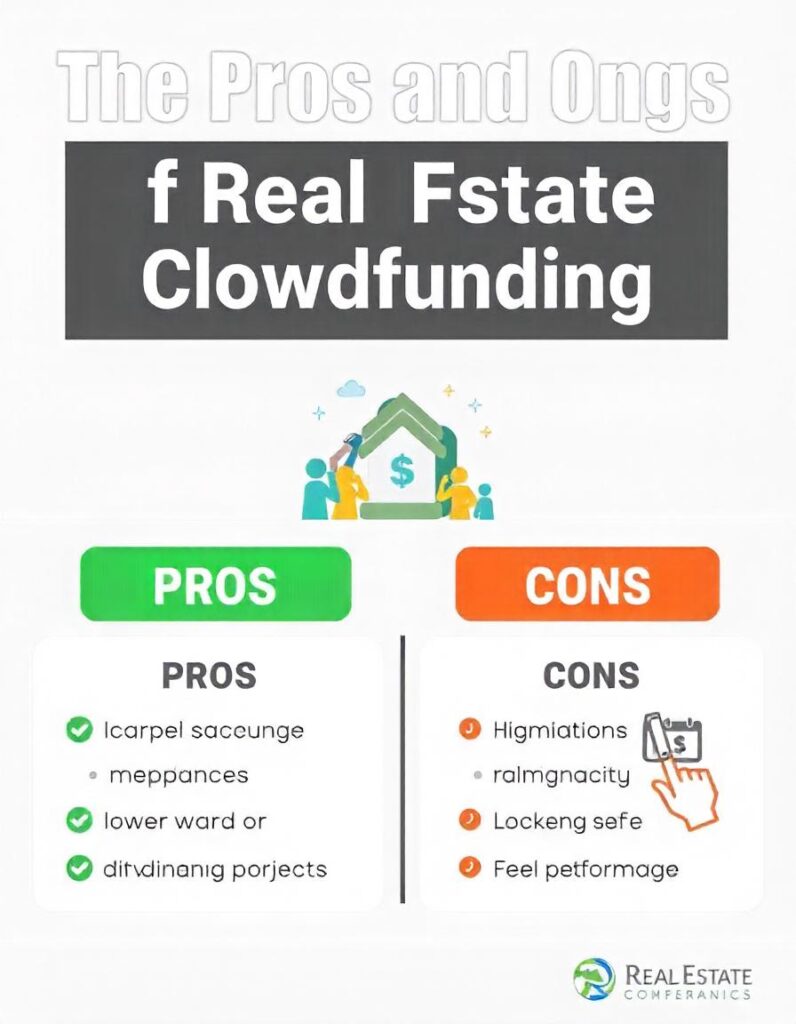Real estate crowdfunding has emerged as a popular investment avenue, offering individuals the opportunity to invest in real estate projects without the need for substantial capital. As with any investment strategy, it’s crucial to understand both the benefits and potential drawbacks. This blog will explore the pros and cons of real estate crowdfunding, helping you make informed decisions about whether it’s the right investment strategy for you.
What is Real Estate Crowdfunding?
Real estate crowdfunding involves pooling funds from multiple investors to finance real estate projects. These projects can range from residential developments to commercial properties. Investors contribute capital in exchange for a share of the returns generated by the project, which could include rental income, interest, or profits from the sale.
Pros of Real Estate Crowdfunding
1. Access to Diverse Investment Opportunities
One of the primary advantages of real estate crowdfunding is the access it provides to a wide range of real estate projects that might otherwise be out of reach. Investors can participate in various types of properties, including:
- Residential Real Estate: Single-family homes, apartment buildings.
- Commercial Real Estate: Office buildings, retail spaces, industrial properties.
- Development Projects: New construction and redevelopment projects.
2. Lower Entry Barriers
Traditionally, investing in real estate requires significant capital. Real estate crowdfunding platforms allow investors to participate with relatively small amounts of money, often starting at a few hundred to a few thousand dollars. This democratizes access to real estate investments and enables a broader range of individuals to diversify their portfolios.
3. Diversification
Real estate crowdfunding offers an opportunity to diversify your investment portfolio across different properties and geographic locations. This diversification can help spread risk and reduce the impact of any single investment’s poor performance on your overall portfolio.
4. Passive Income
Investors in real estate crowdfunding projects often receive regular income from rental payments or interest on their investment. This can provide a steady stream of passive income, depending on the project’s performance.
5. Transparency and Technology
Many real estate crowdfunding platforms provide detailed information about projects, including financial projections, property details, and management teams. The use of technology allows for easy monitoring of investments and access to performance reports.
Cons of Real Estate Crowdfunding
1. Risk of Loss
As with any investment, there is a risk of loss. Real estate projects can face various challenges, such as market downturns, property management issues, or construction delays, which can impact returns or even lead to loss of capital. It’s essential to assess the risk associated with each project and diversify investments to mitigate this risk.
2. Illiquidity
Real estate crowdfunding investments are generally less liquid than other asset classes. Once you commit your funds, it may be challenging to withdraw your investment before the project’s completion. This illiquidity can be a disadvantage if you need quick access to your capital.
3. Limited Control
Investors in real estate crowdfunding projects typically have limited control over the management and decision-making processes of the project. The project’s success largely depends on the expertise and performance of the project managers and developers.
4. Platform Fees
Crowdfunding platforms often charge fees for their services, including administrative fees, management fees, and performance fees. These fees can impact overall returns and should be carefully reviewed before investing.
5. Regulatory Risks
Real estate crowdfunding is subject to regulatory scrutiny and can be influenced by changes in laws and regulations. While platforms are generally compliant with regulations, changes in the legal environment could impact your investment.
How to Assess Real Estate Crowdfunding Opportunities
To make informed investment decisions, consider the following factors:
- Due Diligence: Research the platform, project, and management team. Look for transparency, track records, and thorough project details.
- Diversification: Spread your investments across multiple projects to mitigate risk.
- Understand the Fees: Review and understand all fees associated with the investment to ensure they are reasonable and justified.
- Evaluate the Risk: Assess the project’s risk factors, including market conditions, property location, and financial projections.

